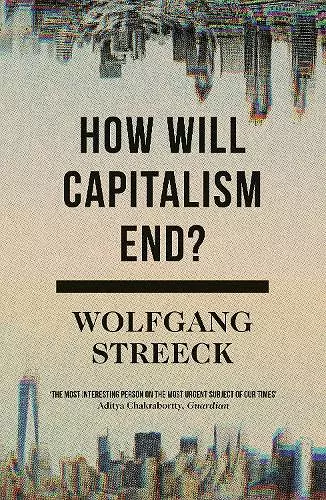How Will Capitalism End?
Essays on a Failing System
Format:Paperback
Publisher:Verso Books
Published:14th Nov '17
Currently unavailable, our supplier has not provided us a restock date

Wolfgang Streeck's How Will Capitalism End? examines the precarious state of capitalism, questioning its future amidst stagnation and inequality.
In How Will Capitalism End?, Wolfgang Streeck explores the precarious state of capitalism as it faces an uncertain future. After years of declining health, the capitalist system finds itself in a critical condition, marked by stagnation and increasing inequality. The once-promising growth has given way to an environment where confidence in the money economy is dwindling, raising questions about the sustainability of this economic model. Streeck's analysis serves as a wake-up call, urging readers to confront the reality of a system that may be on the verge of collapse.
The author argues that the relationship between democracy and capitalism, initially forged in the aftermath of World War Two, is now unraveling. The regulatory institutions that were designed to curb the financial sector's excesses have deteriorated, leaving a vacuum where political agency once thrived. With the fall of communism and the triumph of capitalism at the end of the Cold War, there appears to be no mechanism left to reverse the liberalization of markets, leading to a landscape characterized by oligarchic power and institutional corruption.
As Streeck delves deeper into the implications of this economic decay, he paints a picture of a world where public trust is eroding, and international stability hangs in the balance. The central question remains: will capitalism's demise come with a dramatic bang or a quiet whimper? How Will Capitalism End? is a thought-provoking examination of the forces shaping our economic future.
Streeck's title question-though never answered-opens a window onto the conflict between capitalism and democracy in the neoliberal era. That such a conflict exists is no surprise in Brazil, and still hidden to many in the United States, but a rude and inescapable shock to those who grew up with the comfortable illusions and utopian hopes of post-war Europe. -- James Galbraith, author of The End of Normal
Neoliberalism continues to delimit political choice across the globe yet it is clear that the doctrine is in severe crisis. In Wolfgang Streeck's powerful new book How Will Capitalism End? Streeck demonstrates that the maladies afflicting the world-from secular stagnation to rising violent instability-herald not just the decline of neoliberalism, but what may prove to be the terminal phase of global capitalism. -- Paul Mason, author of Postcapitalism
At the heart our era's deepening crisis there lies a touching faith that capitalism, free markets and democracy go hand in hand. Wolfgang Streeck's new book deconstructs this myth, exposing the deeply illiberal, irrational, anti-humanist tendencies of contemporary capitalism. -- Yanis Varoufakis, author of And the Weak Suffer What They Must?
Streeck writes devastatingly and cogently . How Will Capitalism End? provides not so much a . forecast as a warning. -- Martin Wolf * Financial Times *
As the economic gloom deepens to the pitch black night of geopolitical crisis, in the economics departments of the world there can still be heard the confident chuckle: "but capitalism always survives". Wolfgang Streeck's book How Will Capitalism End? An extended riff on the possibility of the mainstream economists being wrong. Streeck synthesises the various strands of left crisis theory into a convincing proposal -- Paul Mason * Guardian Books of the Year 2016 *
How Will Capitalism End? offers a powerful prognosis that predicts that the system will suffer a lingering death rather than go out with a bang...there are so many startling formulations of great analytic power in this book that it merits wide circulation in these troubled times. * Morning Star *
The most interesting person around today on the subject of the relationship between democracy and capitalism -- Christopher Bickerton, University of Cambridge
This collection will be at the centre of social research for years to come * Times Higher Education [Books of 2016] *
The most interesting person on the most urgent subject of our times -- Aditya Chakrabortty * Guardian *
Democratic capitalism is in bad shape. The crisis of 2007-09 and subsequent election of Donald Trump demonstrate that. In this book, German sociologist Streeck argues that capitalism is doomed, as many have before. But he does not believe it will be replaced by something better. Instead a new Dark Ages lies ahead. * Financial Times [Best Economics Books 2016] *
An important and stimulating book. It is especially interesting in the light of fashionable preoccupations with secular stagnation, the march of robots and the lamentable performance of most leading economies since the onset of the financial crisis. -- William Keegan, author of Mr Osborne’s Economic Experiment
Streeck has become one of Europe's most sophisticated and pessimistic left-wing Euroskeptics...[his] criticism of the eurozone is powerful. -- Jamie Martin * Bookforum *
Not one to embrace the 'voluntaristic illusions' of 'we the people,' Streeck sees such fantasies as part of a deeper structural crisis ... Neoliberalism, in fragmenting workers and consumers into desperately precarious personal brands, has made mass organization effectively impossible, while traditional political channels have been systematically choked off. Capitalism, therefore, won't be overthrown. It will kill itself through its own power to overcome the restraints that bind it. -- Greg Afinogenov * n+1 *
ISBN: 9781786632982
Dimensions: 235mm x 156mm x 17mm
Weight: 413g
272 pages